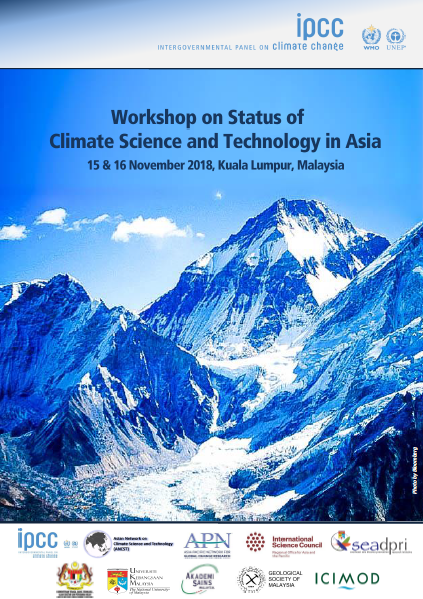Presentation files from the workshop are as follows:
Session 1: Keynote Address
- Keynote Address 1: Climate Science and Technology for Cities
by Professor Lord Julian Hunt, University of Cambridge & University College London - Keynote Address 2: IPCC Special Report on 1.5oC
by Professor Joy Jacqueline Pereira, Vice Chair, IPCC WGp. II & Principal Fellow, SEADPRI- UKM
Session 2: IPCC SIXTH ASSESSMENT REPORT (AR6) OUTLINES
- Outline of Working Group I contribution to the IPCC AR6
by Professor Edvin Aldrian, Vice Chair, IPCC WGp. I & Agency for Assessment and Application of Technology (BPPT), Indonesia - Outline of Working Group II contribution to the IPCC AR6
by Professor Rajib Shaw, Graduate School of Media and Governance, Keio University, Japan - Outline of Working Group III contribution to the IPCC AR6
by Professor Lim Yun-Seng, Universiti Tunku Abdul Rahman, Malaysia - Working Group I – Chapter 12: Perspective on climate change information for Asia
by Dr. Mohammad Rahimi, Faculty of Desert Studies, Semnan University, Iran - Working Group III contribution to the IPCC AR5: A glance on climate change mitigation
by Professor Jafari Mostafa, Macro National Strategic Plan of Climate Change Research AREEO, Iran
Session 3: FAST AND SLOW ONSET CLIMATIC HAZARDS
- Impact of five decades of development process on heat island intensities over a sub-tropical region in India
by Professor Manju Mohan, Indian Institute of Technology, New Delhi, India - Spatio-statistical analysis of flood susceptibility using bivariate model in the floodplain of River Swat, District Charsadda, Pakistan
by Muhammad Farhan Ul Moazzam, Naresuan University, Thailand - Climate related disasters and infrastructure development of Nepal
by Dr. Achyut Tiwari, Tribhuvan University Kathmandu, Nepal - Integrating adaptation, disaster risks and loss to address slow onset processes in Quang Ngai Province
by Dr. Mai Van Khiem, Vietnam Institute of Meteorology, Hydrology and Climate Change, Vietnam - Meso-level analysis on rice-farmer’s adaptive measures for slow onset hazard: The case of saltwater intrusion
by Dr. Catherine Roween Chico Almaden, Xavier University-Ateneo de Cagayan, Philippines - Drought risk management in Cambodia by using ICT: A proposed model
by Dr. Chhinh Nyda, Royal University of Phnom Penh, Cambodia - Slow onset events in Asia: A systematic review of regional trends and the role of science-policy partnerships
by Dr. Denise Margaret S. Matias, German Development Institute, Germany
Session 4: CLIMATE OBSERVATION AND PROJECTION
- Future climate projections for Southeast Asia: What does high resolution climate modelling tell us?
by Dr. Srivatsan V. Raghavan, Tropical Marine Science Institute, National University of Singapore - Impact assessment and model simulation to urban extreme weather vulnerabilities to advance climate adaptation
by Adnan Arshad, China Agricultural University, China - Climate change projections in South and Southeast Asian river basins
by Dr. Sangam Shrestha, Asian Institute of Technology (AIT), Thailand - Quantitative assessment of precipitation changes under CMIP5 RCP scenarios over Northern Pakistan
by Dr. Kamal Ahmed, Lasbela University of Agriculture, Water and Marine Sciences, Pakistan - Greater Himalaya and Aral Sea Region: Modelling glacier response to climate change
by Dr. Oxana S. Savoskul, the International Water Management Institute (IWMI), Sri Lanka
Session 5: CLIMATE IMPACTS AND ECOSYSTEMS
- Effects of rising sea level and changing rainfall patterns on rice and oil palm yields in Peninsular Malaysia
by Dr. Muhammad Firdaus Sulaiman, Faculty of Agriculture, Universiti Putra Malaysia - Climate change impacts on bioclimatic zones and terrestrial ecosystems in Southeast Asia
Dr. Robert Zomer, Kunming Institute of Botany, Chinese Academy of Sciences - Vulnerability and impacts of mangrove ecosystem: A review of South Asia’s (Pichavaram) mangrove management for adaptation
by Dr. A. Saleem Khan, Indian Institute of Technology, Madras, India - Towards SDGs: Forest, market and climate change nexus in Indian Western Himalaya
by Dr. Pariva Dobriyal, Wildlife Institute of India - Enhancing soil function by reusing crop residues for reducing emission from biomass burning
by Dr. Dipayan Dey, South Asian Forum for Environment (SAFE), India - Sustaining climate-impacted terrestrial, coastal, and aquatic ecosystems
by Effendi Tandoko, United Nations University, Institute for the Advanced Studies of Sustainability (UNU-IAS), Japan
Session 6: VULNERABILITY, WELLBEING AND HEALTH
- How do we assess vulnerability to climate change in India? A systematic review of literature
by Dr. Chandni Singh, Indian Institute for Human Settlements, Bangalore, India - Climate risk and vulnerability assessment over Hindu Kush sub-regions (Bajaur, Mohmand and Khyber agencies) of Pakistan
by Dr. Shaukat Ali, GCISC, Ministry of Climate Change, Pakistan - Household vulnerability and adaptation to land and forest degradation in Kanan Watershed, Philippines
Dr. Lorena Sabino, University of the Philippines Los Banos, Philippines - Vulnerability assessment in coastal areas of Misamis Occidental, Southern Philippines
by Dr. Venus Leopardas, Mindanao State University at Naawan, Philippines - Vulnerability of poor women to climate linked water stresses: Case study of slums in capital city of India
by Dr. Jagriti Kher, University of Delhi, India - Potential risk of occurring tropical diseases in mountain regions of Central Asia
by Professor Asylbek Aidaraliev, International University of Kyrgyzstan

